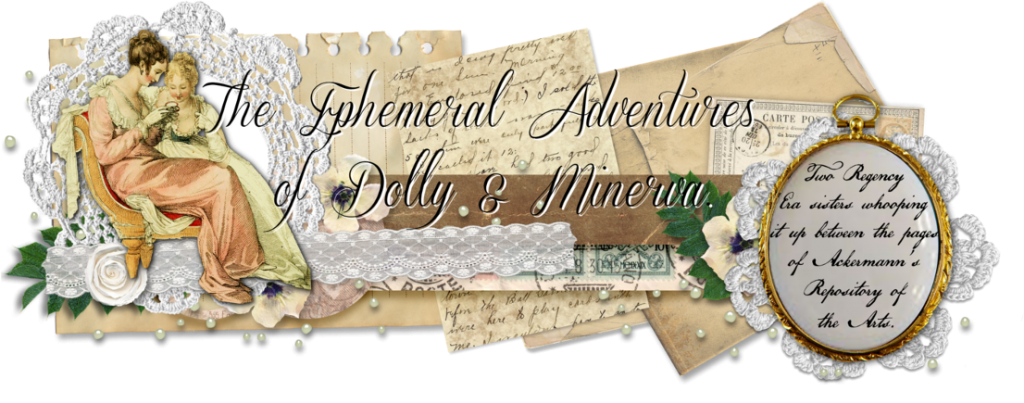Well, what's a woman to do with all those spare hours, but feather her nest and trim her bonnets? Look at those Jane Austen movies where a visitor arrives unexpectedly and the ladies of the house quickly smooth themselves down and snatch up some embroidery so it looks as if they'd just been caught during a quiet moment perched on the divan. It just wouldn't do to have people see you working. Handwork shows that a woman has time, patience, and a desire to make the world a more beautiful place. Besides, women are better at 'fiddly work', as Princess Diana once said to women factory workers.
A cousin once complimented an outfit I was wearing, and I told her that I had made it myself. "Wow! You're really good at sewing," she replied. "I'm really good at buying nice clothes". That's how Dolly and Minerva see it. Women in those days had their clothing made by seamstresses, as ready-to-wear was not available. Gowns were often embroidered with whitework or broderie anglaise, what we would recognize on eyelet trimming today, but most often the fabric would be purchased from women who did that sort of work as a living. Dolly and Minerva could go to Mr. Ackermann's shop, or one he recommends, buy all the lovely fabrics and trims they needed, and then visit the dressmaker, armed with one of Mr. Ackermann's fashion plates. As the simplicity of the first decade of the 19th century gave way to more and more ornamentation, women had to focus on trims and appliqué, often moving them from one garment to another.
A wonderful movie is The Heiress, starring Olivia de Havilland and Montgomery Clift, based on Henry James' novel Washington Square. Catherine Sloper, a plain, shy, and awkward heiress meets a handsome man who, inexplicably to her, showers her with attention. Her unfeeling father believes the young man is only after her money, but she is convinced that he truly loves her. Her father decides to leave her penniless if she marries this opportunist, which makes no difference to her. Will it make a difference to Morris? There is an awful scene when Catherine tries of convince her father that Morris loves her for herself. The father retorts with insults about her qualities, adding, "I've known you all your life and I have never known you to learn anything. With one exception, my dear, you embroider neatly."



So glad you visited me. I became hooked on creating digital vignettes set in the Georgian and Regency periods after stumbling across My Fanciful Muse. I am your newest follower. Have a fabulous week!
ReplyDeleteWelcome, Susan! (and fellow addict!) I am so indebted to My Fanciful Muse. I've got this HUGE file labeled EKD. I'm glad I stumbled across your blog, too! Have tons of fun with it.
DeleteAdded your button to my page.
ReplyDelete